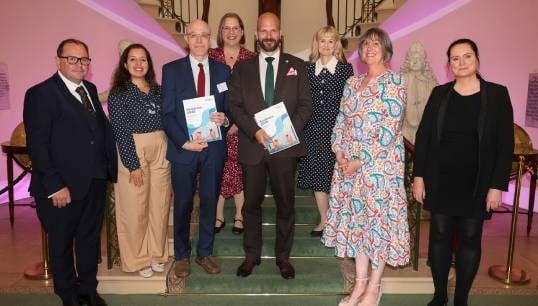- Topics
- Campaigning
- Careers
- Colleges
- Community
- Education and training
- Environment
- Equality
- Federation
- General secretary message
- Government
- Health and safety
- History
- Industrial
- International
- Law
- Members at work
- Nautilus news
- Nautilus partnerships
- Netherlands
- Open days
- Opinion
- Organising
- Podcasts from Nautilus
- Sponsored content
- Switzerland
- Technology
- Ukraine
- United Kingdom
- Welfare
UK seafarers face 'vanishing communities' as new report warns of 40% decline by 2040
14 October 2025

A major new study commissioned by the Maritime Charities Group (MCG) has sounded the alarm over the future of UK seafarer communities, warning of a predicted 40% reduction by 2040. The Seafarer 2040 report, based on large data sets and direct interviews with seafarers, families, and maritime charities, highlights both challenges and opportunities for the maritime welfare sector to adapt in the face of profound demographic change. Deborah McPherson talks to MCG chair Dr Tim Slingsby about the findings from the research which Nautilus took part in
A wake-up call
The Seafarer 2040 report's key phrase, 'vanishing seafarers communities', was deliberately chosen to underline the severity of the projected decline, explains Dr Slingsby.
These communities encompass working seafarers, retired and former seafarers, and their dependent families.
'This does sound depressing, but it's also a wake-up call,' adds Dr Slingsby. 'If we lose seafarer communities, we lose not just the people themselves but the many threads that tie them to our economy and coastal life.'
Those threads are considerable. Around 90% of UK trade moves by sea, while naval vessels safeguard national and global interests. Seafarers also sustain coastal communities through links to food production, fishing, tourism, and – increasingly – offshore energy. Yet, despite their importance, public understanding of the sector remains limited.
Who counts as a seafarer?
'Defining "seafarer" for the study was not straightforward, as you can imagine,' says Dr Slingsby, 'particularly given new and emerging maritime roles.'
The research focuses on civilian seafarers in the UK Merchant Navy and fishing fleets, as well as those working aboard commercial vessels. This includes crew accounted for by the Maritime and Coastguard Agency and UK Chamber of Shipping.
The picture is not uniform across all groups. For example, the number of ratings in the Merchant Navy, seafarers in the 40–44 age group, Northern Irish fishing crew, and part-time fishers are projected to remain stable up to 2040, bucking the wider trend of decline.
Why the decline?
The report itself examined the 'what' rather than the 'why', but other research sheds enough light on potential causes, says Dr Slingsby. He points to studies led by Professor Helen Sampson and colleagues at the Seafarers International Research Centre, Cardiff University, which have shown how outdated industry practices persist, often lagging behind modern workplace norms. Factors such as limited access to social care, childcare, and healthcare were also raised during interviews.
The Union has long campaigned on related issues: barriers to training, gender imbalance, insufficient funding, and the problem of 'sea blindness' − the lack of awareness ashore of how much society relies on maritime labour.
Implications for welfare charities
For maritime charities, such as the Nautilus Welfare Fund which runs Mariners' Park in Wallasey, UK, the implications are immediate, says Dr Slingsby. 'A declining and changing demographic profile means maritime charity services must adapt. Crucially, many seafarers and, notably, their families, remain unaware of the support already available.'
The report emphasises the need for better visibility explains Dr Slingsby: 'We should be shouting about the services that charities provide and getting communication right from the very beginning.'
Collaboration, not competition, is also key. With potentially fewer seafarers to serve, duplication of effort between charities could weaken the overall safety net. Instead, charities are urged to work together to provide stronger, more effective support.
Eligibility and evolving needs
The study also recommends reviewing eligibility criteria for welfare services, such as care home residency or caseworker assistance.
Dr Slingsby explains that the report does not dictate that independent charities should change their rules, but stresses that shifting demographics will require an effective response. This could even involve changes to charitable constitutions or objects, or new plans for use of financial reserves.
Challenges and opportunities
The transition to new fuels, the rapid pace of technological change, and the increasing impact of climate change all add uncertainty to seafaring careers, says Dr Slingsby. Injury and harm rates remain higher in this sector than in most others.
'But the tone is not entirely bleak. The report is also an opportunity to highlight the excitement and rewards of life at sea. For those considering a maritime career, the report underlines both the essential role of seafarers in the national economy and the commitment of the charity sector to support them from training through to retirement.'


Seafarer welfare services
Nautilus director of welfare and care Andrew Jones took part in a panel discussion during the launch of the Seafarers 2040 report.
Mr Jones said the Maritime Charities Group research, to which the Nautilus Welfare Fund contributed, pointed to a large seafaring community who were often unaware of services for retired mariners. Charities need to collaborate and shout more about these services, as well as find ways to build awareness early in a maritime career – from cadet training onwards. Lobbying for the UK Census to include a maritime professional option for careers could be another option to improve data. In terms of adapting eligibility criteria, Mr Jones said the Fund had last year already expanded eligibility for residency at Mariners' Park to anyone aged 55+ who has worked in the Merchant Navy, Royal Navy, or maritime sector. Applications are assessed based on service length and care needs.
Union perspective
For Union members, the findings echo long-standing concerns about training pathways, fair access to work, and maintaining standards in welfare provision. The message is clear: if seafarers' communities are allowed to dwindle without action, the loss will be felt not just by individuals but across the entire economy and society.
Looking ahead
The MCG is now planning a series of workshops and webinars to help charities and stakeholders prepare for the changes ahead. By 2040, the face of UK seafaring will look markedly different. The message of this report is that whether the community vanishes − or evolves into something more resilient − will depend upon decisions made today about training, welfare, and visibility.
For maritime unions, the report reinforces the urgency of ongoing campaigns: breaking down barriers to entry, addressing sea blindness, and ensuring that welfare services keep pace with modern realities. The future of seafarers may be uncertain, but the need for strong representation and solidarity has never been clearer.
Tags
